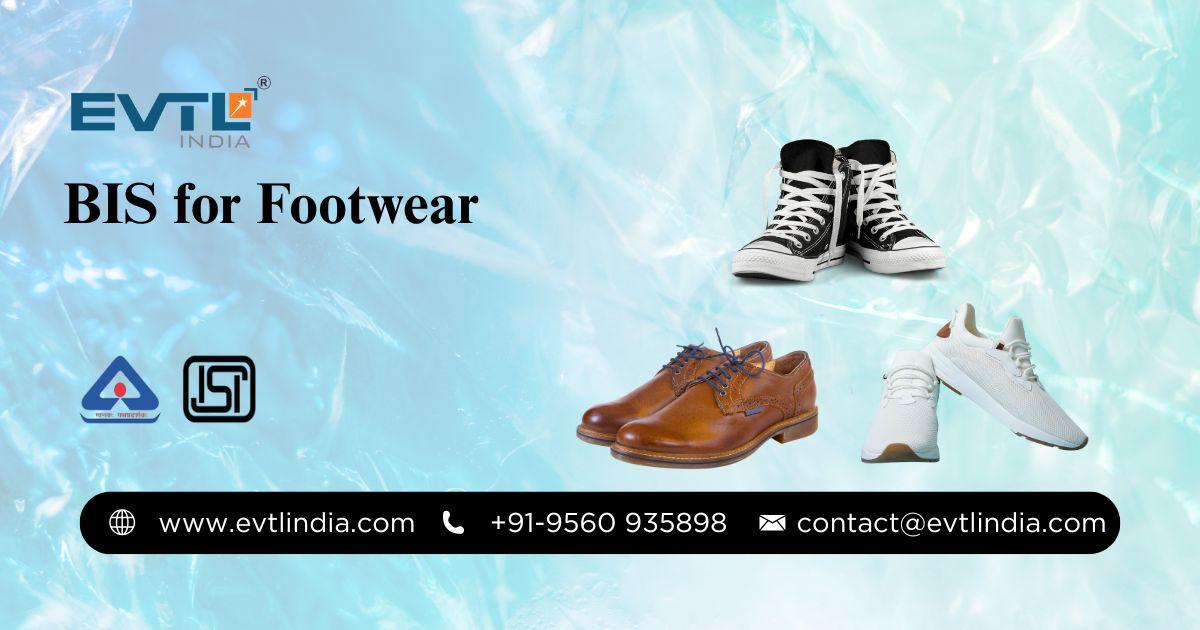A Complete Guide to BIS Certification for Footwear Manufacturers in India

The Indian footwear industry is booming—with domestic and international brands tapping into the country’s vast consumer base. In such a competitive market, maintaining quality, safety, and compliance is not a choice but a necessity. One critical step in this direction is obtaining the BIS Certification for Footwear. This certification ensures that shoes meet the required standards of safety, durability, and performance as defined by the Bureau of Indian Standards (BIS).
Let’s explore why BIS for Footwear matters, how to obtain the ISI Mark for Footwear, and how expert consultants can simplify the process for manufacturers and importers alike.
Why Footwear Needs BIS Certification
Footwear is more than a fashion accessory. It directly affects user health, safety, and comfort. Ill-fitting or poorly constructed footwear can cause injuries, postural problems, and even long-term foot disorders. Recognizing this, the Indian government, through BIS, mandates strict compliance with predefined quality benchmarks for different types of footwear.
From school shoes to industrial boots, BIS has introduced multiple product standards to cater to diverse usage. Manufacturers dealing in BIS for Shoes must comply with these standards to ensure customer safety and legal conformity.
Legal Mandate Under Quality Control Order (QCO)
The Ministry of Commerce and Industry has implemented Quality Control Orders (QCOs) making it mandatory for manufacturers and importers to get BIS Certification for Footwear. The applicable Indian Standards (IS) depend on the type of footwear, such as:
-
IS 15298: Safety Footwear
-
IS 5676: Rubber Hawai Chappals
-
IS 11226: Leather Safety Boots
-
IS 6721: Canvas Shoes
Non-compliance can lead to penalties, product recalls, and restrictions on selling in the Indian market. Therefore, having the ISI Mark for Footwear is not just about quality—it's a license to operate legally.
Key Benefits of BIS for Footwear Manufacturers
Getting certified with BIS for Footwear offers several strategic advantages:
-
Market Access: You can legally sell products across India.
-
Brand Trust: Customers and retailers trust ISI-marked products more readily.
-
Export Boost: BIS certification is recognized in many trade agreements.
-
Product Consistency: Standardized production leads to fewer defects and returns.
Whether you manufacture traditional leather shoes or modern sports footwear, the certification significantly elevates your market value.
Step-by-Step Process to Obtain BIS Certification for Footwear
Obtaining the ISI Mark for Footwear involves a detailed procedure. Here’s how it works:
1. Product Testing
Your footwear sample must be tested in a BIS-approved laboratory to check compliance with relevant Indian Standards.
2. Application Submission
You must apply online via the BIS portal, submitting required documents like product specifications, manufacturing process flowchart, factory layout, and quality manual.
3. Inspection by BIS Officials
BIS officers will visit your factory to assess production capability, raw materials, lab setup, and adherence to quality norms.
4. Grant of License
If all requirements are met, BIS issues a license and allows you to use the ISI mark on your footwear products.
5. Surveillance and Renewal
Post-certification, periodic inspections are conducted to ensure sustained compliance.
Common Challenges in the Certification Process
Many manufacturers—especially small and medium enterprises—face hurdles like:
-
Complex documentation
-
Non-compliant production methods
-
Lack of in-house testing facilities
-
Misunderstanding of applicable IS codes
This is where a BIS consultant for Footwear becomes crucial.
Role of a BIS Consultant for Footwear
Hiring a seasoned consultant can significantly reduce your certification timeline and ensure smooth navigation through BIS compliance procedures.
Here's what a consultant typically assists with:
-
Identifying applicable IS codes for your product range
-
End-to-end documentation and application filing
-
Coordinating with BIS labs for sample testing
-
Preparing for factory audits and mock inspections
-
Advising on corrective measures if your facility falls short
A ISI Mark Consultant for Footwear also keeps you updated with regulatory changes and ensures timely license renewals.
Categories of Footwear Covered Under BIS Certification
The BIS has made provisions for several footwear categories under different IS standards. Some of the major ones include:
-
Safety Footwear: Essential for industrial and construction workers.
-
Rubber and PVC Footwear: Popular in rainy seasons and slippery environments.
-
Children's Footwear: Requires extra testing for harmful substances and ergonomic design.
-
Formal and Casual Shoes: Mostly leather or synthetic upper, tested for tensile strength, color fastness, etc.
Whether you produce mass-market slippers or high-end formal shoes, BIS for Shoes ensures uniform quality and safety.
Importance of ISI Mark for Footwear Retailers and Importers
Retailers must also be aware of BIS obligations. Selling non-ISI-marked footwear in categories where BIS certification is mandatory can lead to stock seizures, fines, or business license suspension.
Importers need to secure the BIS license before customs clearance. Without it, goods may be held up at ports or rejected outright. Consulting with a ISI Mark Consultant for Footwear can help streamline this process and avoid legal trouble.
Recent Government Moves to Enforce Footwear Quality
In recent years, BIS has ramped up efforts to enforce compliance in the footwear sector. The QCO notifications have made it clear that only ISI-marked footwear will be allowed in the Indian market for many categories.
Inspections, raids, and quality checks are becoming more common. This regulatory tightening is expected to improve product quality across the board but also demands that manufacturers take the BIS process seriously.
Conclusion: Stay Ahead with BIS Certification
EVTL India is one of the leading BIS Consultant in India, helping manufacturers obtain their BIS licences hassle-free. The Indian market is rapidly maturing, and customer expectations around quality are rising. Aligning with BIS norms isn’t just about avoiding penalties—it's a strategic investment in your brand’s future.
Working with an experienced BIS consultant for Footwear can help you cut through the red tape and ensure your products are market-ready. In a sector where trust is crucial, the ISI Mark for Footwear becomes your passport to consumer confidence, legal compliance, and long-term business growth.







